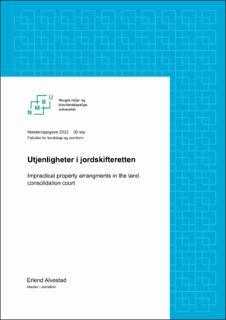| dc.contributor.advisor | Sky, Per kåre | |
| dc.contributor.author | Alvestad, Erlend | |
| dc.coverage.spatial | Norway | en_US |
| dc.date.accessioned | 2022-08-23T10:46:29Z | |
| dc.date.available | 2022-08-23T10:46:29Z | |
| dc.date.issued | 2022 | |
| dc.identifier.uri | https://hdl.handle.net/11250/3013059 | |
| dc.description.abstract | Jordskifteretten behandler utjenlige eiendomsforhold. Gjennom partene sine påstander om utjenlige eiendomsforhold foretar jordskifteretten en vurdering om utjenlighetsvilkåret i jskl. § 3-2 er oppfylt eller ikke. Begrepet «utjenlighet» er knyttet til jordskifterettens skjønn. Formålet med oppgaven er å få fram hva som ligger i begrepet «utjenlighet» eller «utjenlige eiendomsforhold». I et forsøk på å få dette fram, er det innsamlet saker, hvor utjenlighet blir utrykket gjennom partene og jordskifteretten.
Oppgaven er begrenset til dette begrepet, og til utjenligheter ved arealbytte og bruksordninger. Hovedproblemstillingen er: «Utjenligheter ved arealbytte etter jskl. § 3-4 og bruksordninger etter jskl. § 3-8, uttrykket av parter og jordskifteretten i Urbane, semi-urbane og rurale områder». For å svare på hovedproblemstillingen er det utarbeidet tre delproblemstillinger:
1) Hva anser partene som utjenlig og hvilke vurderinger av utjenlighetsvilkåret tar jordskifteretten ved arealbytter i urbane, semi-urbane og rurale områder?
2) Hva anser partene som utjenlig og hvilke vurderinger av utjenlighetsvilkåret tar jordskifteretten ved bruksordning i urbane, semi-urbane og rurale områder?
3) Hva blir definert som ikke utjenlig av jordskifteretten, og hva peker rekvirent på som utjenlig?»
Hva som anses som utjenlig er i stor grad avhengig av eiendomsforholdene, partene og til dels området eiendommer befinner seg i. Problemstilling 1 og 2 tar for seg hvilke forhold parter og jordskifteretten anser som utjenlig i de ulike områdene. Den tredje problemstillingen omhandler eiendommer som ikke ble betraktet som utjenlig av jordskifteretten. Undersøkelsen bygger på 57 jordskiftesaker for jordskifteretten, lagmannsrett og høyesterett. Hvor det er hovedvekt av saker for jordskifteretten. Videre viser undersøkelsen at eiendomsforhold som utforming, arrondering, veier, rettigheter, bruksretter, avtaler, reguleringsplan, formålsgrenser i reguleringsplan, samarbeid, adkomst m.m. blir ansett som utjenlig av både parter og jordskifteretten. | en_US |
| dc.description.abstract | The land consolidation court solves impractical property arrangments. Through the parties claims about impractical property, the land consolidation court makes an assessment of the tearm «impractical» in jskl. § 3-2 is fulfilled or not. What the term «impractical» contains is up to the court to decide. The purpose of the studie is to clerify what the term «impractical» or «impractical property arrangments» contains. I an attempt to clerify the term, multiple court cases have been analysed, where the term «impractical» is expressed trough parts and the land consolidation court.
The studie is limited to this term, and to impractical property conditions with the use of modifications to property and rules on joint use. The main issue is: «The term «impractical» in area exchange section 3-4 and usage arrangment section 3-8 expressed by parts and the land consolidation court in urban, semiurban and rural areas». To answer the main question, three subproblems have been developed.
1) What does the parts perceive as «imprectical» and which assements does the Land consolidation court take to account in area exchange in urban, semiurban and rural areas.
2) What does the parts prerceive as «imprectical» and which assements does the Land consolidation court take to account in usage arrangments in urban, semiurban and rural areas.
3) What is defined as not impractical by the land cosolidation court, and what does the requester preceive as impractical.
What is preceived as impractical is depentent of the property conditions, parts and partly where the property is. Subproblem one and two takes in account what conditions the parts and the court assesses as impractical in the different areas. The third subproblem concerns cases that were not considered impractical by the land consolidation court.
The survey builds upon a documentstudie of 57 cases before the land consolidation court, court of appeal and the supreme court. There is mainly cases from the land consolidation court. The survey show that the shape of the property, roads, rights, agreements, zoning plans, purpose limits in zoning plans, cooperation, main access to property and more is evaluated as impractical conditions by parts and the land consolidation court. | en_US |
| dc.language.iso | nob | en_US |
| dc.publisher | Norwegian University of Life Sciences, Ås | en_US |
| dc.rights | Attribution-NonCommercial-NoDerivatives 4.0 Internasjonal | * |
| dc.rights.uri | http://creativecommons.org/licenses/by-nc-nd/4.0/deed.no | * |
| dc.title | Utjenligheter i jordskifteretten | en_US |
| dc.title.alternative | Impractical property arrangments in the land consolidation court | en_US |
| dc.type | Master thesis | en_US |
| dc.description.localcode | M-EIE | en_US |

